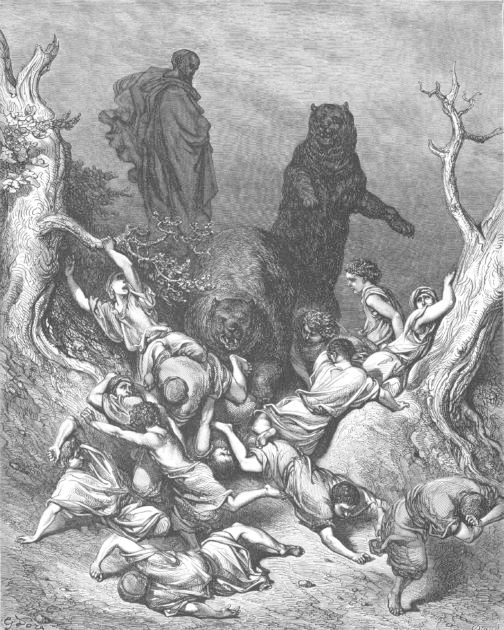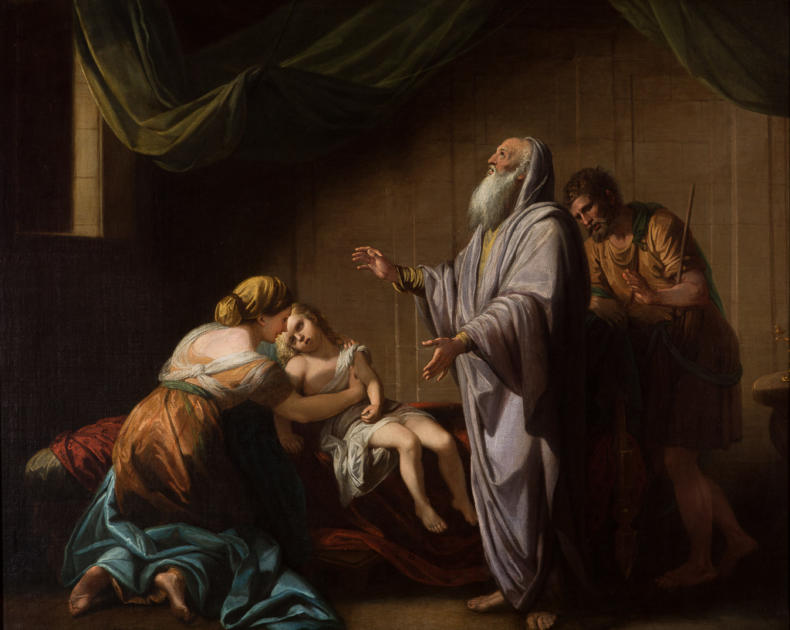Yes, I admit, she, of all the women in the Bible, is my hero. She did not perform the heroics of providing wells of water for the Israelites in the wilderness (Miriam), nor did she receive an oracle from God about masterminding the plot to guarantee the future of our people (Rebecca), nor did she pound a tent peg into the head of a sleeping enemy general (Yael). We don’t even know her name. And although she experienced miraculous things, she herself was a down-to-earth role model for women in every era, and a model of the power of empathy. A gedolah, a great woman.
In fact, the first description we read of the Shunamite woman (so-called because she is from the town of Shunem) is that she is an ishah gedolah — a great woman. The consensus of translators seems to be that gedolah (great) refers to her wealth. Indeed, she had the financial means to build an addition onto her house to accommodate the prophet Elisha, a visitor who only came a few times a year — no small expense in antiquity.
I choose to understand the word gedolah, however, as referring to her wisdom. It’s the same word we use to refer to the Rabbinic scholars who demonstrated Torah learning and sagacious rulings. The Shunamite woman’s capacity for empathy, her ability to grow spiritually and facilitate the spiritual growth of others, her willingness to be proactive, and her humility are all qualities that I cherish and seek to emulate.
Empathic Embracing Hospitality
With your help, My Jewish Learning can provide endless opportunities for learning, connection and discovery.
II Kings chapter 4, where we find her story, is also the haftarah portion which corresponds to parshat Vayera — which tells of the miraculous birth of Abraham and Sarah’s son Isaac as well as the binding of Isaac. There are at least three clear parallels: hospitality, a prophecy to a barren woman that she will bear a son, and the near-death experience of that son.
In parshat Vayera, Abraham welcomed road-weary strangers into his tent, with keen attention to their needs (bathing, resting, food). Likewise, the Shunamite woman, standing in her doorway, noticed that the prophet Elisha came to Shunem regularly as he traveled around the land teaching and caring for the people. Wisely, she recognized both his great acts and his needs, and said to her husband: “I am sure it is a holy man of God who comes here regularly. Let us make a small enclosed upper chamber and place a bed, a table, a chair, and a lampstand there for him, so that he can stop there whenever he comes to us.” In both cases, Abraham and the Shunamite woman focused on empathy to determine the needs of their visitors.
Spiritual Growth through a Healing Embrace
The Shunamite woman also was modest, undemanding, and seemingly self-aware. By contrast, Elisha was a busy and emotionally inaccessible man of God. In the wake of the death of his mentor Elijah, Elisha’s detachment was so great that his quick temper resulted in the tragic death of 42 children who were teasing him.

The detached Elisha was thoughtful enough to reward the Shunamite woman for her hospitality, but didn’t do it personally. Instead, he sent his servant, Gehazi, to offer money and protection, which she politely turned down — asking nothing in return for her generosity.
Still looking to reward their hostess, Gehazi and Elisha made another plan — completely without her input. Gehazi pointed out to Elisha that their hostess was barren, and the prophet decided to reward her with the miracle of a child (again echoing the story in Vayera with Abraham and Sarah). A key difference is that unlike the other barren women in the Bible (Sarah, Rebecca, Rachel, Hannah, Samson’s mother, and Michal), the Shunamite woman had not been praying for a child, nor did her life seem to be incomplete without one. It was Elisha’s idea for her to become a mother, not hers. He delivered this prophecy to her: “At this season next year you will be embracing a son.”
The woman indeed became a mother and then we read of her child wandering in the heat of the day without water, becoming dehydrated, then sick, and ultimately dying. It seems that more supervision would have prevented his death—the lack of it is surprising in a woman we know to be attentive and empathetic. What’s going on? Perhaps the Shunamite woman could not allow herself to be totally emotionally involved with an unexpected and un-asked for child conceived as a result of a prophecy in her later years? (Contrast that to Sarah, the original helicopter mom.)
But despite her detachment, when tragedy struck, the Shunamite woman clicked into Mama Bear mode. Leaving her dead child laid out on Elisha’s bed in her home, she mounted a donkey, headed to find Elisha, and demanded that he personally attend the child.
Despite the longtime connection between Elisha and the Shunamite woman, the prophet was still so emotionally detached that at first he sent only Gehazi to attend to the child. But the Shunamite woman knew she needed more than Elisha’s servant — she needed the prophet himself.
Because of her deep empathy for Elisha, the Shunamite woman knew precisely what words to use to shake him from his detachment: “As the Lord lives and as you live, I will not leave you,” she cried. This utterance was a precise echo of the impassioned words with which Elisha himself had implored his beloved mentor, Elijah, not to die. And they worked — Elisha and the woman now rushed to the bedside of the child.

At the Shunamite woman’s house, Elisha immediately entered the upstairs room — his own generously provided room, and bent over the dead child on the bed — his own carefully prepared bed. And then, he lay on top of the boy, hands to hands, eyes to eyes, mouth to mouth, and breathed into the child the breath of life — the embrace of life, as he had prophesied (“At this season next year you will be embracing a son.”)
Imagine that! Elisha, who had cursed 42 children with death by bear-mauling just because they had taunted him for being bald, was now stirred to absolute heart-to-heart empathy. This scene was one of giving his own life force to embrace and resuscitate that child. Reviving the child also revived Elisha to empathy and attachment. And the incident revived the Shunamite woman, too, to bond with her son: “And the woman bent down, and picked up her child, and embraced him.”
May we all be inspired by the healing power of radical empathy.
Want to get to know more amazing, complicated, and relatable biblical personalities? Sign up for a special email series here.



